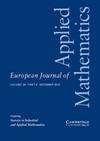Consensus-based optimisation with truncated noise
IF 1.1
4区 数学
Q1 MATHEMATICS, APPLIED
引用次数: 0
Abstract
Consensus-based optimisation (CBO) is a versatile multi-particle metaheuristic optimisation method suitable for performing non-convex and non-smooth global optimisations in high dimensions. It has proven effective in various applications while at the same time being amenable to a theoretical convergence analysis. In this paper, we explore a variant of CBO, which incorporates truncated noise in order to enhance the well-behavedness of the statistics of the law of the dynamics. By introducing this additional truncation in the noise term of the CBO dynamics, we achieve that, in contrast to the original version, higher moments of the law of the particle system can be effectively bounded. As a result, our proposed variant exhibits enhanced convergence performance, allowing in particular for wider flexibility in choosing the noise parameter of the method as we confirm experimentally. By analysing the time evolution of the Wasserstein-基于共识的优化与截断噪声
基于共识的优化(CBO)是一种通用的多粒子元启发式优化方法,适用于在高维度下进行非凸和非平滑的全局优化。它在各种应用中被证明是有效的,同时也适合理论收敛分析。在本文中,我们探讨了 CBO 的一种变体,它结合了截断噪声,以增强动态规律统计的良好稳定性。通过在 CBO 动力学的噪声项中引入额外的截断,我们发现,与原始版本相比,粒子系统规律的高矩数可以有效地受到约束。因此,我们提出的变体具有更强的收敛性能,尤其是在选择方法的噪声参数时具有更大的灵活性,这一点已得到我们的实验证实。通过分析相互作用粒子系统的经验度量与目标函数全局最小值之间的 Wasserstein- $2$ 距离的时间演化,我们严格证明了所提出的 CBO 变体的期望收敛性,只需对目标函数和初始化做最低限度的假设。数值证据证明了在 CBO 中截断噪声的好处。
本文章由计算机程序翻译,如有差异,请以英文原文为准。
求助全文
约1分钟内获得全文
求助全文
来源期刊
CiteScore
4.70
自引率
0.00%
发文量
31
审稿时长
>12 weeks
期刊介绍:
Since 2008 EJAM surveys have been expanded to cover Applied and Industrial Mathematics. Coverage of the journal has been strengthened in probabilistic applications, while still focusing on those areas of applied mathematics inspired by real-world applications, and at the same time fostering the development of theoretical methods with a broad range of applicability. Survey papers contain reviews of emerging areas of mathematics, either in core areas or with relevance to users in industry and other disciplines. Research papers may be in any area of applied mathematics, with special emphasis on new mathematical ideas, relevant to modelling and analysis in modern science and technology, and the development of interesting mathematical methods of wide applicability.

 求助内容:
求助内容: 应助结果提醒方式:
应助结果提醒方式:


